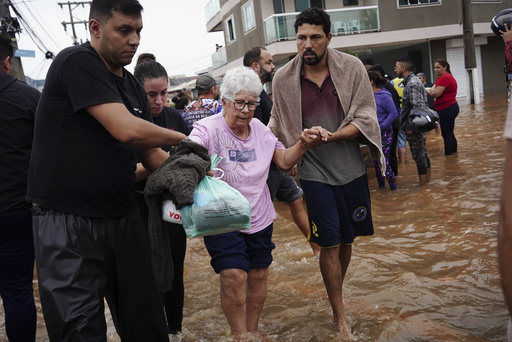RIO DE JANEIRO (AP) — Massive floods in Brazil’s southern Rio Grande do Sul state have killed at least 75 people over the last seven days, and another 103 were reported missing, local authorities said Sunday.
At least 155 people were injured, while damage from the rains forced more than 88,000 people from their homes. Approximately 16,000 took refuge in schools, gymnasiums and other temporary shelters.
The floods left a wake of devastation, including landslides, washed-out roads and collapsed bridges across the state. Operators reported electricity and communications cuts. More than 800,000 people are without a water supply, according to the civil defense agency, which cited figures from water company Corsan.
A rescue team pulled an elderly man in serious medical condition into a helicopter from a remote area in the Bento Gonçalves municipality, according to footage from military firefighters. Torrents of brown water poured over a nearby dam.
On Saturday evening, residents in the town of Canoas stood up to their shoulders in muddy water and formed a human chain to pull boats carrying people to safety, according to video footage shared by local UOL news network.
The Guaiba river reached a record level of 5.33 meters (17.5 feet) on Sunday morning at 8 a.m. local time, surpassing levels seen during a historic 1941 deluge, when the river reached 4.76 meters.
“I repeat and insist: the devastation to which we are being subjected is unprecedented,” state Gov. Eduardo Leite said Sunday morning. He had previously said the state will need a “kind of ‘Marshall Plan’ to be rebuilt.”
Brazilian President Luiz Inácio Lula da Silva visited Rio Grande do Sul for a second time on Sunday, accompanied by Defense Minister José Múcio, Finance Minister Fernando Haddad and Environment Minister Marina Silva, among others. The leftist leader and his team surveyed the flooded streets of Porto Alegre from a helicopter.
“We need to stop running behind disasters. We need to see in advance what calamities might happen and we need to work,” Lula told journalists afterwards.
During Sunday mass at the Vatican, Pope Francis said he was praying for the state’s population. “May the Lord welcome the dead and comfort their families and those who had to abandon their homes,” he said.
The downpour started Monday and was expected to last through Sunday. In some areas, such as valleys, mountain slopes and cities, more than 300 millimeters (11.8 inches) of rain fell in less than a week, according to Brazil’s National Institute of Meteorology, known by the Portuguese acronym INMET, on Thursday.
The heavy rains were the fourth such environmental disaster in the state in a year, following floods in July, September and November 2023 that killed 75 people.
Weather across South America is affected by the climate phenomenon El Niño, a periodic, naturally occurring event that warms surface waters in the Equatorial Pacific region. In Brazil, El Niño has historically caused droughts in the north and intense rainfall in the south.
This year, the impacts of El Niño have been particularly dramatic, with a historic drought in the Amazon. Scientists say extreme weather is happening more frequently due to human-caused climate change.
“These tragedies will continue to happen, increasingly worse and more frequent,” said Suely Araújo, a public policy coordinator at the Climate Observatory, a network of dozens of environmental and social groups.
Brazil needs to adjust to the effects of climate change, she said in a Friday statement, referring to a process known as adaptation.
___
Follow AP’s climate and environment coverage at https://apnews.com/hub/climate-and-environment
This website uses cookies so that we can provide you with the best user experience possible. Cookie information is stored in your browser and performs functions such as recognising you when you return to our website and helping our team to understand which sections of the website you find most interesting and useful.
